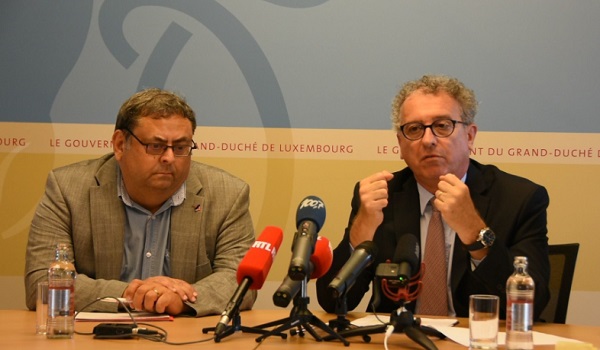
From the beginning of next year, certain changes will take effect regarding the taxation of non-residents and individualisation in Luxembourg.
At a press conference held at the Ministry of Finance, Pierre Gramegna and Jean-Claude Bernardini from the OGBL trade union presented two adjustments to the tax reform package due to take effect on 1 January 2018, relating to the taxation of non-residents, as well as individualisation.
Regarding the taxation of non-residents, the tax reform that came into force on 1 January 2017 provides for the taxation of resident and non-resident taxpayers from the 2018 taxation year. At present, section 157 of the amended Income Tax Act of 4 December 1967 makes the assimilation of non-resident taxpayers subject to the condition that the non-resident taxpayer must be taxable for at least 90% of its total income, both domestic and foreign, in the Grand Duchy.
However, this has contributed to long-term disparities in treatment between resident and non-resident tax payers, as non-resident taxpayers who were married were in practice placed in Class 2, provided that more than 50% of the couple's professional income was taxable in Luxembourg. The granting of class 2 implied a collective taxation of both spouses in which foreign income was ignored, unlike the case of resident taxpayers.
Under the tax reform, non-resident taxpayers who are married will, by 2018, be ranked by default in class 1. Those who fulfil the conditions of assimilation provided for in Article 157 may opt, as residents for collective taxation (class 2), for pure individual taxation (class 1), or for individual taxation with reallocation (class 1).
This principle implies that from 2018 certain non-resident married taxpayers who do not meet the 90% criterion will be in class 1, whereas before the reform they could classify in class 2 if 50% of their occupational income was taxable in Luxembourg.
The second subject discussed at this meeting concerns the irrevocable and preliminary character of the demand for the individual taxation mode (individual taxation pure or individual taxation with reallocation) from 2018.
The current legislation states that taxpayers who are married must choose the taxation method, and therefore the applicable tax class, before the beginning of the taxation year. It was noted that this obligation to make an ex ante choice made it difficult for the taxpayer to make a decision, given that his family situation and his precise income must be taken into account.
Accordingly, the Minister of Finance proposed and the Governing Council agreed to waive the preliminary and irrevocable character of the choice of individual taxation for married taxpayers, both residents and non-residents, thereby allowing them greater flexibility. In practice, this means that the taxpayer can communicate his choice to the administration either before 31 December 2017, throughout the year 2018, or during the first three months of 2019. This measure benefits both residents and non-residents.
Photo by MFIN. L-R: Jean-Claude Bernardini, member of the Executive Committee of the OGBL; Pierre Gramegna, Minister of Finance








